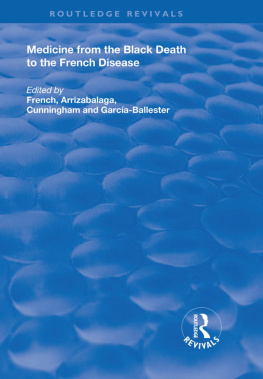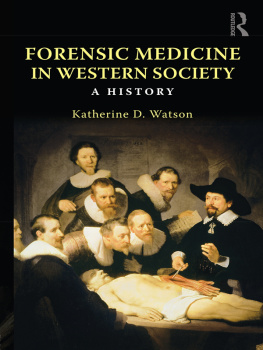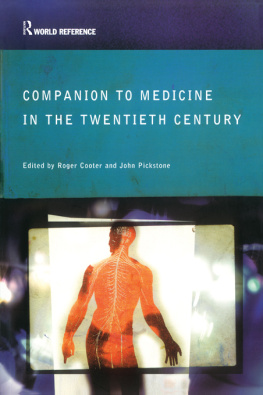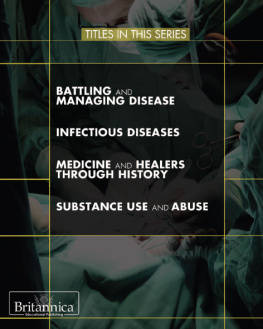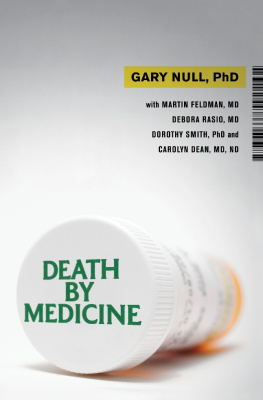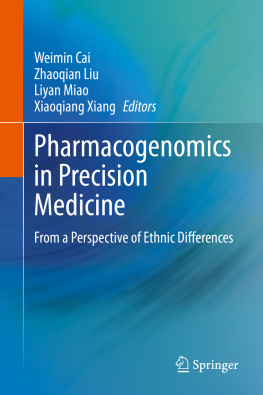Medicine from the Black Death to the French Disease
The History of Medicine in Context
Series Editors: Andrew Cunningham and Ole Peter Grell, Wellcome Unit for the History of Medicine,
Department of History and Philosophy of Science, University of Cambridge
Titles in this series will include:
Faith, Medical Alchemy and Natural Philosophy: Johan Moriaen, Reformed Intelligencer and the Hartlib Circle J. T. Young
The Making of the Dentiste, c. 1650-1760 Roger King
'The Battle for Health': A Political History of the Socialist Medical Association, 1930-51 John Stewart
Medicine from the Black Death to the French Disease
Edited by
Roger French, Jon Arrizabalaga, Andrew Cunningham and Luis Garca-Ballester
First published 1998 by Ashgate Publishing
Reissued 2019 by Routledge
2 Park Square, Milton Park, Abingdon, Oxon, OX14 4RN
52 Vanderbilt Avenue, New York, NY 10017
Routledge is an imprint of the Taylor & Francis Group, an informa business
Roger French, Jon Arrizabalaga, Andrew Cunningham, Luis Garca-Ballester and the contributors, 1998
The authors have asserted their moral right under the Copyright, Designs and Patents Act, 1988, to be identified as the authors of this work.
All rights reserved. No part of this book may be reprinted or reproduced or utilised in any form or by any electronic, mechanical, or other means, now known or hereafter invented, including photocopying and recording, or in any information storage or retrieval system, without permission in writing from the publishers.
Notice:
Product or corporate names may be trademarks or registered trademarks, and are used only for identification and explanation without intent to infringe.
Publisher's Note
The publisher has gone to great lengths to ensure the quality of this reprint but points out that some imperfections in the original copies may be apparent.
Disclaimer
The publisher has made every effort to trace copyright holders and welcomes correspondence from those they have been unable to contact.
A Library of Congress record exists under LC control number:
Typeset in Sabon by Manton Typesetters, 5-7 Eastfield Road, Louth, Lincolnshire, LN11 7AJ
ISBN 13: 978-0-367-19504-5 (hbk)
ISBN 13: 978-0-429-20299-5 (ebk)
Contents
Roger French
Ron Barkai
Michela Pereira
Fernando Salmn and Montserrat Cabr
Vivian Nutton
Katherine Park
Michael R. McVaugh
Peter Murray Jones
Jon Arrizabalaga
Ann G. Carmichael
Roger French and Jon Arrizabalaga
Roger French
Guide
Jon Arrizabalaga
Consejo Superior de Investigaciones Cientficas, Barcelona, Spain
Ron Barkai
Tel Aviv University, Israel
Monsterrat Cabr
Universitt Autnoma de Barcelona, Barcelona, Spain
Ann G. Carmichael
Indiana University, USA
Andrew Cunningham
Wellcome Unit for the History of Medicine, Cambridge University, UK
Roger French
Department of History and Philosophy of Science, Cambridge University, UK
Luis Garca-Ballester
Universidad de Cantabria, Santander, Spain
Peter Murray Jones
King's College, Cambridge, UK
Michael R. McVaugh
The University of North Carolina at ChapelHill, USA
Katherine Park
Wellesley College, Massachusetts, USA
Michela Pereira
University of Siena, Italy
Vivian Nutton
Wellcome Institute for the History of Medicine, London, UK
Fernando Salmn
Universidad de Cantabria, Santander, Spain
Chapter One
Introduction: The 'Long Fifteenth Century' of Medical History
Roger French
The Black Death of 1348-49 was a watershed in Western history. Since it killed perhaps a third of the population it perhaps could hardly have been otherwise. Its economic and demographic effects were great. In medical terms it marks the end of a period when the medical faculties were instituted and developed in the universities. The university physicians had established themselves on the narrow rung at the top of the medical ladder. It marked the height of scholastic medicine. The form of the commentary reached a degree of elaboration that was never exceeded.
The 'long fifteenth century' of European medicine (i.e. c .l348- c .l500) saw a slow recovery from the major effects of the Black Death, despite recurrent outbreaks. It saw the spread of universities, often modelled on that of Paris, across Europe. Scholastic medicine retained its form but was increasingly challenged from outside by new intellectual movements like Italian civic humanism and eventually by Hellenism. The long century was ended by the introduction of new ideals within medicine and the collapse of some features of the scholastic mode of instruction, events symbolized by the appearance of the editio princeps of the printed Greek Galen and the disappearance of the medieval textbook. The long century ended, as it had begun, with the arrival of a dreadful new disease; both had their effects on European medicine.
One of these effects was to put pressure on the medical hierarchy. The university-trained doctors claimed a monopoly of the practice of internal medicine on the grounds of the superior effectiveness of their medicine. But their claim could only be enforced under certain circumstances, normally where there was an important faculty. The university physicians were few in number and competed for custom with a range of other practitioners, from travelling purveyors of nostrums to surgeons and medical specialists who had legitimate but partial licences from corporations other than the faculty, mostly guilds and civil examination boards. Minorities like Jews and women could practise legitimately, or at least without harassment, in niches of the medical market.
But the market could be disturbed at moments of medical crisis, as by the two epidemics we consider here. Scholarly medicine before the Black Death was not designed to cope with general catastrophes. University physicians believed that disease was a personal imbalance of humours: they studied their patients' particular constitutions and managed their regime over a long period of time. Indeed, an ideal career was to become attached to a court or a household of a great man as a medical retainer with constant advice on his lips. The great epidemics did not fit this pattern. The Black Death killed its victims in a few days. The French Disease stubbornly resisted attempts to achieve a balance of the humours. Both were entities, diseases that happened to people, rather than individuals submitting to their own innate or acquired weaknesses and hence coming to have 'unbalanced' humours. And both were widespread, happening much more, in absolute terms, to the mass of people who could not afford the physician's fees than to those who could.
The physicians were uncertain about what to do. Some took their own advice and fled quickly, stayed away a long time, and came back slowly. Those who stayed could not easily identify either of the new diseases and accordingly could not agree on a treatment. Other kinds of practitioners took advantage of the absence or uncertainty of the physicians. Empirics often had their favoured remedies, and in the absence of elaborate and impressive theory they now had what was marketable: specific medicines for a specific disease, at a price well below the level of the physician's fees.

